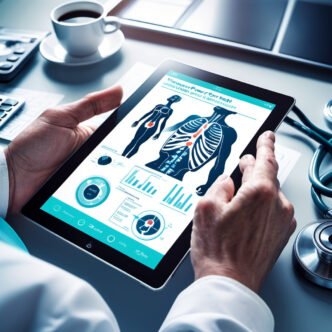In recent years, the intersection of healthcare and technology has given rise to a dynamic and transformative field known as “health tech.” This burgeoning sector encompasses a wide range of innovations, from wearable devices that monitor vital signs to advanced artificial intelligence (AI) systems that aid in diagnosing complex medical conditions. Health tech is reshaping the way healthcare is delivered, making it more personalized, efficient, and accessible.
A Historical Perspective
The roots of health tech can be traced back to early technological innovations in medicine. In the 19th century, inventions like the stethoscope and X-ray machines revolutionized diagnostics. The 20th century saw the advent of electronic health records (EHRs), enabling better data management and patient care. However, it is in the 21st century that health tech has truly come into its own, driven by advancements in digital technology, big data, and connectivity.
Key Areas of Health Tech
- Wearable Technology
Wearable devices such as fitness trackers, smartwatches, and biosensors have become ubiquitous. These gadgets monitor various health metrics, including heart rate, blood pressure, oxygen levels, and sleep patterns. By providing real-time data, wearables empower individuals to take charge of their health and enable early detection of potential health issues.
- Telemedicine
Telemedicine has revolutionized access to healthcare. Through video consultations and remote monitoring, patients can connect with healthcare providers from the comfort of their homes. This approach is especially beneficial in rural or underserved areas where medical facilities may be scarce. During the COVID-19 pandemic, telemedicine became a lifeline for millions, ensuring continuity of care while minimizing exposure risks.
- Artificial Intelligence and Machine Learning
AI and machine learning (ML) are driving significant advancements in health tech. Algorithms can analyze vast amounts of medical data to identify patterns and provide diagnostic insights. For example, AI-powered tools are being used to detect conditions like cancer, diabetic retinopathy, and heart disease with remarkable accuracy. Additionally, predictive analytics helps in identifying at-risk populations and personalizing treatment plans.
- Robotics in Healthcare
From surgical robots to robotic exoskeletons, robotics is revolutionizing healthcare delivery. Surgical robots enhance precision in complex procedures, reducing recovery times and improving outcomes. Meanwhile, robotic exoskeletons are aiding in rehabilitation for patients with mobility impairments, offering new hope for recovery.
- Digital Health Records
The shift from paper-based to digital health records has streamlined patient care. EHRs enable seamless information sharing among healthcare providers, improving coordination and reducing errors. Patients also benefit from easier access to their medical history, fostering better engagement in their care.
- Mobile Health Applications
The proliferation of smartphones has given rise to a plethora of health apps. These applications cater to diverse needs, from tracking fitness goals to managing chronic conditions like diabetes and hypertension. Many apps also offer mental health support, providing resources for stress management, meditation, and therapy.
Benefits of Health Tech
The impact of health tech on healthcare systems and individuals is profound. Key benefits include:
- Improved Accessibility: Health tech bridges the gap between patients and providers, especially in remote or underserved regions.
- Cost Efficiency: By streamlining processes and enabling preventive care, health tech can reduce healthcare costs significantly.
- Enhanced Patient Engagement: Tools like wearables and mobile apps empower patients to actively participate in their health management.
- Personalized Care: Advanced analytics and AI enable tailored treatment plans, improving outcomes and patient satisfaction.
- Early Detection and Prevention: Continuous monitoring and predictive analytics facilitate early intervention, potentially saving lives.
Challenges in Health Tech
Despite its promise, health tech faces several challenges:
- Data Privacy and Security: The collection and storage of sensitive health data raise concerns about cybersecurity and patient privacy.
- Regulatory Hurdles: Navigating the complex landscape of healthcare regulations can delay the deployment of innovative solutions.
- Integration Issues: Ensuring interoperability among diverse health tech systems remains a significant challenge.
- Digital Divide: Not all populations have equal access to health tech, leading to disparities in care.
- Ethical Concerns: The use of AI and other technologies in decision-making raises questions about accountability and transparency.
Future Trends in Health Tech
The future of health tech is brimming with possibilities. Emerging trends include:
- Precision Medicine: Advances in genomics and data analytics are paving the way for highly personalized treatments based on an individual’s genetic makeup.
- Remote Monitoring: Enhanced sensors and IoT devices will enable even more sophisticated remote monitoring, reducing hospitalizations and improving chronic disease management.
- Blockchain for Healthcare: Blockchain technology has the potential to secure medical records and streamline data sharing while maintaining patient privacy.
- Virtual Reality (VR) and Augmented Reality (AR): VR and AR are finding applications in surgical training, pain management, and mental health therapy.
- Decentralized Clinical Trials: Technology-driven approaches are enabling clinical trials to be conducted remotely, increasing participation and efficiency.
Conclusion
Health tech is transforming the healthcare landscape, offering solutions that are not only innovative but also life-changing. As technology continues to evolve, it holds the potential to address many of the challenges faced by traditional healthcare systems. However, realizing this potential requires a concerted effort to overcome barriers, ensure equitable access, and address ethical concerns. With a patient-centered approach and continued innovation, health tech promises to usher in a new era of healthcare that is smarter, more efficient, and ultimately, more human.













